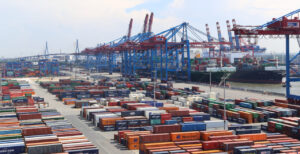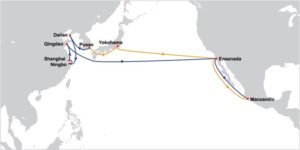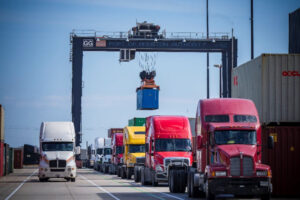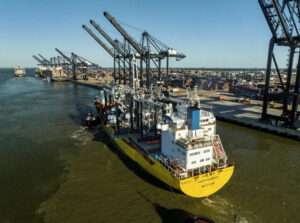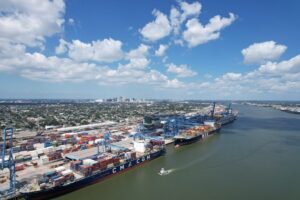AIDrivers CEO and founder, Dr Rafiq Swash, was one of the 5 panellists in the discussion on the hot topic of innovation projects and real-world results.
The focus of AIDrivers has been in this area for several years and so his commentary was incredibly pertinent and insightful on the subject.
Acknowledging the constant growth and technological advancement in the port sector, Dr Swash was clear that we still have many challenges to face. Over the last three decades, artificial intelligence (Ai) has developed from its basic origins to a more useable technology but there is still so much that can be achieved with further development.
Dr Swash explained that ports need more resilient automation and the Ai can be used to develop a self-ware system which will provide much better proactivity to make the jump forward to the next level needed for future ports.
The usual method to implement new automation systems means building completely fresh sites which incur enormous costs. He believes that AIDrivers’ technology is the workaround to the usually prohibitive cost dilemma by delivering a solution to incorporating Ai into the current workflow.
To do this, the company retrofits its Ai enabled autonomous solutions to existing fleets to create driverless trucks and cranes. In essence, computing powers optimise the current brownfield environments to make them self-ware, resilient and efficient.
Not only are costs minimised by using AIDrivers’ solutions, but many other efficiencies can be achieved on top of this. Efficiencies are increased, savings in energy usage shoot up and the productivity of each vehicle is optimised.
The retrofitting of the equipment and use of the software to run existing fleets mean that consumption is also reduced rendering this a green sustainable option. The self-awareness and self-diagnostic capability of Ai enabled autonomous trucks increase maintenance efficiencies and significantly reduce expensive down-time.
Dr Swash explained that port terminals are ‘simply sophisticated’ meaning that the processes are highly complex using what can be deemed outdated equipment namely, diesel trucks and cranes.
Effective solutions are desperately needed to overcome the existing limitations to automate systems, bring better precision and maintain safety without need of big investment. If this can be done without a change to the overall infrastructure, then this is undoubtedly an attractive proposition for port businesses.
Retrofitting the Ai-enabled autonomous mobility technology to heavy vehicles in ports will deliver the responsivity and safety necessary for successful operations.
The process churns out enormous quantities of data which in turn can be used to increase the precision of the operations. Utilising this data will continue to power fully integrated automated systems which is the ultimate goal.
Conscious of the human element in the upgrading of port terminals, Dr Swash illustrated that jobs will be created in the maintenance and systems management of the fleets as human drivers become obsolete.
Using the concept of a digital twin, humans can evaluate the drive of vehicles such as port trucks and cranes to test the integrity of systems. Increased navigation system aptitudes can also come off the back of this testing.
This virtual environment can also be used for training existing drivers for public awareness when they mixed with autonomous trucks and can help to reduce the nervousness to share the road with self-drive vehicles.
Dr Swash was clear that Ai is the future of ports and that to this end the ‘future is very bright in this paradigm’ showing his commitment to, and belief in, the cutting-edge Ai enabled autonomous technology that AIDrivers produces and delivers globally for a better green energy engineering to reduce emissions as well as create sustainable jobs.
The panel discussion allowed each speaker to highlight their area of expertise in relation to new technology innovation in the port industry. From the importance of machine learning as per Meena Shah of Navis to the real-world applications and results seen by Stephan Trauth of Yardeye in his Vancouver case study. Panagiotis Fragkos, of DP World focussed on safety, transparency and productivity and Piet Opstaele of the Port of Antwerp showcased the innovation taking place in his business.
Collectively, it was clear that Ai, machine learning and new automation technology implementation are imperative to create resilient ports for sustainable future.


